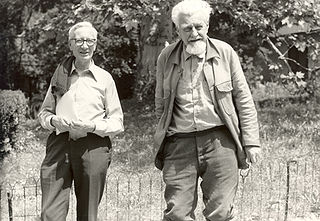 Evolutionary psychology is grounded in Charles Darwin's work in evolutionary biology, particularly his theories of natural and sexual selection. William D. Hamilton's theory of inclusive fitness is also quite important. Natural selection states that those that are more suitable to the environment are more likely to survive and thus leave their more desirable genes available to the next generation. Sexual selection, on the other hand, favours traits that make mates more attractive to the opposite sex and therefore gives mating advantages. This obviously leads to their same genes being passed on more readily. Inclusive fitness is a theory of selflessness whereby a certain being will see it fit to protect not only himself, but also others who carry similar genetics – with the purpose of trying to increase the reproduction of its own superior genes. Through this type of group selection, you will see acts of 'altruism'.
Evolutionary psychology is grounded in Charles Darwin's work in evolutionary biology, particularly his theories of natural and sexual selection. William D. Hamilton's theory of inclusive fitness is also quite important. Natural selection states that those that are more suitable to the environment are more likely to survive and thus leave their more desirable genes available to the next generation. Sexual selection, on the other hand, favours traits that make mates more attractive to the opposite sex and therefore gives mating advantages. This obviously leads to their same genes being passed on more readily. Inclusive fitness is a theory of selflessness whereby a certain being will see it fit to protect not only himself, but also others who carry similar genetics – with the purpose of trying to increase the reproduction of its own superior genes. Through this type of group selection, you will see acts of 'altruism'.
Evolutionary psychology uses these theories, but has developed it's own view that is largely independent of other biological fields. In particular, evolutionary psychologists believe that a relatively short period in history is responsible for a relatively large portion of our evolutionary development.
According to Tooby and Cosmides, evolutionary psychology's theoretical foundations rest on the following six principles:¹
The brain is a computer designed by natural selection to extract information from the environment.
Individual human behaviour is generated by this evolved computer in response to information it extracts from the environment. Understanding behaviour requires articulating the cognitive programs that generate the behaviour.
The cognitive programs of the human brain are adaptations. They exist because they produced behaviour in our ancestors that enabled them to survive and reproduce.
The cognitive programs of the human brain may not be adaptive now; they were adaptive in ancestral environments.
Natural selection ensures that the brain is composed of many different special purpose programs and not a domain general architecture.
Describing the evolved computational architecture of our brains “allows a systematic understanding of cultural and social phenomena” ¹
These theoretical underpinnings provides the reasoning to why evolutionary psychologists believe that all human behaviours should be explained by psychological mechanisms. This is what puts evolutionary psychology apart from other biological evolutionary research.
Reference:
1.Tooby, J. and L. Cosmides, 2005, “Conceptual Foundations of Evolutionary Psychology”, in The Handbook of Evolutionary Psychology, D. Buss (ed.), Hoboken, NJ: Wiley.
Image: Nobel Laureates Nikolaas Tinbergen(left) and Konrad Lorenz (right)
Source: Wikimedia Commons
